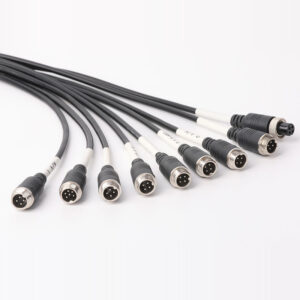In contemporary industrial and automation sectors, M12 cables are indispensable for secure connections and data transmission. Celebrated for their reliability, ruggedness, and versatility, M12 cables are prevalent in a myriad of industrial environments, from sensors and actuators to comprehensive factory automation systems. This article explores various types of M12 cables, particularly focusing on M12 4-pin cables, M12 5-pin cables, and M12 connector cables, divulging their specific applications and advantages.
A Primer on M12 Cables
M12 cables get their name from the metric thread with a 12mm diameter used in their connectors, known for their circular design. These connectors, initially standardized by the Deutsches Institut für Normung (DIN), are lauded for their compact yet durable build, making them well-suited for harsh operating conditions.
M12 4Pin Cable
Among the most ubiquitous types of M12 cables is the M12 4-pin cable, primarily employed in sensor device connections. These cables encompass four wires, each designated for different signal transmissions, adept at supporting elementary signal and power supply functions. Their applications include:
– Sensor and Actuator Connections: Within automation systems, M12 4-pin cables are used to transmit sensor signals to control systems, applicable in various devices such as temperature sensors and pressure sensors.
– Industrial Data Communication: These cables are also integral to industrial Ethernet protocols like PROFINET and EtherNet/IP, particularly where high data transmission rates and reliability are requisite.
M12 5Pin Cable
Compared to the 4-pin variant, the M12 5-pin cable introduces an additional signal wire, broadening its functionality and application spectrum. The fifth wire often serves purposes such as transmitting supplementary signals or providing grounding, thus enhancing current capacity and accommodating complex signal transmission requirements:
– Advanced Sensor Applications: The extra pin allows the M12 5-pin cable to support more sophisticated sensors, facilitating additional signal transmissions and meeting diverse data and power demands.
– Fieldbus Systems: In industrial automation systems, 5-pin cables are used in various fieldbus protocols, such as DeviceNet and CANopen, which require extra signal lines for data communication and device synchronization.
Advantages of M12 Connector Cables
Compared to other connector types, M12 connector cables offer numerous distinctive advantages:
– High Protection Ratings: Typically, M12 connectors boast protection ratings like IP65 and IP67, enabling functionality in dusty or wet environments. This characteristic makes them particularly well-suited for outdoor applications or harsh conditions found in industrial workshops.
– Reliable Mechanical Performance: Thanks to their screw-locking mechanism, M12 connectors exhibit exceptional mechanical stability and resistance to vibration, making them ideal for use in dynamic or vibrational environments.
– Versatility and Adaptability: M12 connectors come in various coding types, such as A-coding, B-coding, and D-coding, each suited for different signal and power transmission needs. This versatility allows them to adapt to a wide range of applications.
– High Data Transmission Capacity: With the advancement of Industry 4.0, the importance of data transmission rates and reliability has skyrocketed. M12 connector cables support high-speed industrial Ethernet applications, ensuring rapid and accurate data transfer within complex network environments.
Conclusion
In contemporary industrial and automation applications, M12 cables and connectors, due to their high performance and reliability, have become standard choices. Whether it’s the M12 4-pin cable used for sensor data transmission or the M12 5-pin cable for more complex applications, these connectors demonstrate remarkable adaptability and durability. As technology continues to evolve, M12 connector cables will play increasingly crucial roles in industrial automation, smart manufacturing, and IoT applications, providing stable and efficient connection solutions for various devices.
The deployment of M12 cables thus represents a strategic decision for industries aiming to streamline their operations and enhance performance. Their robust design, stringent protection standards, and compatibility with varied communication protocols ensure that M12 cables will remain at the forefront of industrial connectivity solutions, facilitating seamless integration across numerous sectors.



